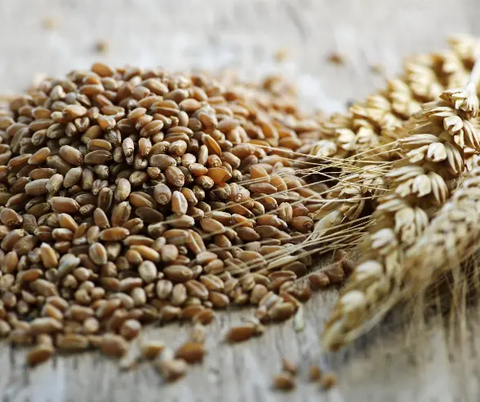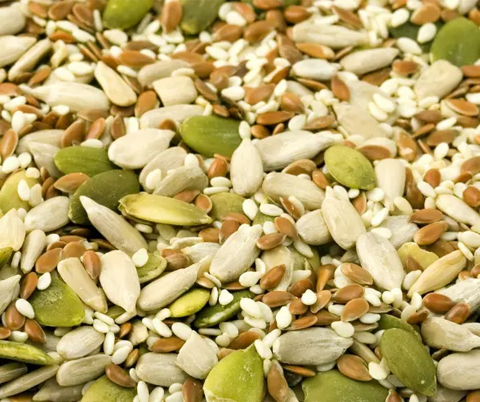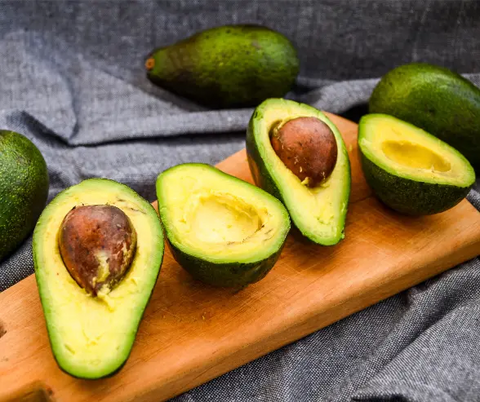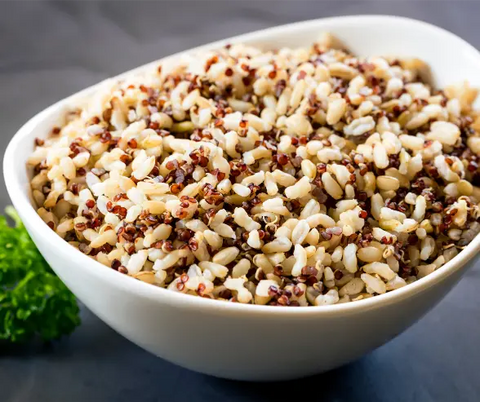Your Cart is Empty
- Shop
- About
- Learn
- Free Domestic Shipping Over $50
- +1(800)929-8935
- Login
- Free Domestic Shipping Over $50
- +1(800)929-8935

The quest for happiness can often lead us down a path of holistic health practices, where the foods we eat play a pivotal role in our overall well-being.
The right diet can act as a natural remedy for mood swings and depressive symptoms.1 Its components range from amino acids that serve as building blocks for mood-boosting neurotransmitters to complex carbohydrates that maintain stable blood sugar levels for balanced energy.
Here's a closer look at 19 mood-boosting foods that can help you harness the mood-boosting benefits of a healthy diet.
Before diving into the list, it's important to acknowledge that the relationship between diet and mood is multifaceted. Nutrients from food can influence brain chemistry and, therefore, affect mood and mental health.2
However, attributing mood improvements solely to specific foods without considering the broader context of an individual's diet, lifestyle, and genetic makeup may oversimplify the issue.

Dark chocolate is not just a guilty pleasure; it's a powerhouse of mood-boosting benefits. It's rich in flavonoids, which are antioxidants that increase blood flow to the brain, enhancing brain function and boosting mood.
Moreover, dark chocolate stimulates the production of feel-good hormones, such as endorphins and serotonin, contributing to a happier state of mind. Moderation is key, as dark chocolate also contains caffeine and sugar.3
Opting for varieties with a high cocoa content (70% or more) and low sugar content maximizes the mood-boosting benefits while minimizing potential drawbacks.
Fatty fish like salmon, mackerel, and albacore tuna are excellent sources of omega-3 fatty acids, particularly EPA and DHA, which are crucial for maintaining brain health and emotional well-being.2 These fatty acids are integral components of cell membranes in the brain and are known to play a significant role in mood regulation.
Regular consumption of fatty fish has been associated with a reduced risk of depressive disorders and improved mood. Omega-3s also possess anti-inflammatory properties, further supporting brain health and mood stability

Whole grains are a staple for maintaining stable blood sugar levels, which is crucial for balanced energy and mood throughout the day.
Foods such as oats, quinoa, brown rice, and whole wheat provide complex carbohydrates that are slowly digested, ensuring a steady release of glucose into the bloodstream.4 This prevents the blood sugar spikes and crashes associated with refined carbs and sugary foods, which can lead to mood swings and irritability.
Whole grains are a good source of B vitamins, which play a role in the production of serotonin, further contributing to a positive mood and emotional well-being.
Berries, including strawberries, blueberries, raspberries, and blackberries, are packed with antioxidants, particularly vitamin C and flavonoids, which have been shown to reduce stress and inflammation in the body.
Berries contain antioxidants that combat oxidative stress and protect cells, which can positively affect mood and mental health. Their natural sweetness can also satisfy sweet cravings without the mood-dampening effects of added sugar.

Nuts and seeds are nutritional powerhouses, rich in healthy fats, proteins, vitamins, and minerals that support mood and brain health.
For instance, walnuts are one of the few plant-based sources of omega-3 fatty acids, while almonds provide magnesium, a mineral that has a calming effect on the nervous system.4
Pumpkin seeds and flaxseeds are rich in tryptophan, an amino acid that the body converts into serotonin, the neurotransmitter responsible for feelings of happiness and well-being.
Incorporating a variety of nuts and seeds into your diet can help boost your mood and provide sustained energy throughout the day.
Fermented foods like yogurt, kefir, sauerkraut, and kimchi are rich in probiotics, the beneficial bacteria that play a crucial role in maintaining gut health.
The gut-brain axis, a complex communication network linking the gut and brain, suggests that a healthy gut microbiota can positively affect mood and cognitive function.4
Probiotics from fermented foods can enhance the production of mood-boosting neurotransmitters like serotonin and dopamine, thereby potentially improving mood and reducing the risk of mood disorders.

Green tea is a beverage celebrated not only for its antioxidant properties but also for its ability to promote a state of calm alertness. It contains L-theanine, an amino acid that can cross the blood-brain barrier and increase the activity of the neurotransmitter GABA, which has anti-anxiety effects.2, 5
Additionally, green tea has a modest amount of caffeine, which can enhance alertness and mood. The combination of L-theanine and caffeine in green tea is thought to improve focus, calmness, and mood better than caffeine alone.
Leafy greens such as spinach, kale, and Swiss chard are loaded with vitamins and minerals that are essential for mood regulation and brain health. They are particularly high in folate (vitamin B9), magnesium, and iron, nutrients that play key roles in the production of serotonin and dopamine.4
Low levels of these nutrients have been linked to higher rates of depressive symptoms. Incorporating leafy greens into your diet can contribute to improved mood, reduced stress, and overall enhanced well-being.

Bananas are a great source of vitamin B6, which is necessary for converting tryptophan into serotonin, a neurotransmitter that stabilizes mood and promotes happiness.
Bananas contain natural sugars and fiber, which help to ensure a steady release of energy, preventing mood swings and supporting overall emotional stability.6
The combination of fiber, vitamin B6, and natural sweetness makes bananas an ideal mood-boosting snack.
Lentils and beans are not only excellent sources of plant-based protein but also rich in dietary fiber, which can help stabilize blood sugar levels and prevent mood swings.2 They also contain a wealth of other nutrients important for mental health, including iron, zinc, magnesium, and B vitamins.
These legumes support the slow release of glucose into the bloodstream, providing balanced energy and mood throughout the day. Their high fiber content promotes gut health, further supporting mood regulation through the gut-brain axis.

Avocados are full of healthy monounsaturated fats, which are essential for brain health and function. These fats contribute to healthy blood flow, which is crucial for maintaining a healthy brain.
Avocados are also rich in tryptophan, an amino acid required for serotonin production, and folate, which is important for optimal brain function and mood regulation.7
The combination of healthy fats, fiber, and vitamins in avocados makes them an excellent food for supporting mood and cognitive health.
Oysters are an outstanding source of zinc, a mineral vital for mental health and clarity. Zinc plays a critical role in the nervous system's function and in regulating neurotransmitter pathways that influence mood.8
Low levels of zinc have been associated with an increased risk of depression and other mood disorders. Regular consumption of zinc-rich foods like oysters can support brain health, mood regulation, and overall well-being.

Bell peppers, particularly the brightly colored red, yellow, and orange varieties, are abundant sources of vitamin C. This essential vitamin plays a significant role in reducing stress and improving mood.
Vitamin C reduces cortisol, a stress hormone, and helps synthesize dopamine, a neurotransmitter associated with pleasure and happiness.9
Incorporating bell peppers into your diet can provide a delicious and colorful way to boost your mood and enhance your overall mental well-being.
Sweet potatoes are rich in complex carbohydrates, which are crucial for maintaining stable blood sugar levels and ensuring a steady supply of energy to the brain.
They're also packed with beta-carotene and other antioxidants that help reduce inflammation and oxidative stress, factors that can negatively affect mood.
The fiber in sweet potatoes aids in slow digestion, contributing to a calm and stable mood. Their natural sweetness can satisfy cravings without the mood fluctuations associated with refined sugars.10

Turkey is well-known for its high content of tryptophan, an essential amino acid that the body uses to produce serotonin, often referred to as the "feel-good" neurotransmitter. Serotonin plays a crucial role in mood regulation, and its production can lead to feelings of relaxation and contentment.11
Consuming tryptophan-rich foods like turkey can help increase serotonin levels, promoting a sense of calm and improving sleep quality, both of which are important for a positive mood.
Chia seeds are tiny nutritional powerhouses packed with omega-3 fatty acids and dietary fiber, both of which are beneficial for mood and overall health.
The omega-3s in chia seeds, particularly alpha-linolenic acid (ALA), are essential for brain function and may help combat depression and anxiety. The fiber in chia seeds supports digestive health, which is closely linked to mood through the gut-brain axis.12
Adding chia seeds to your diet can be a simple way to boost your mood and promote well-being.

Quinoa is a highly nutritious grain that provides a complete protein, meaning it contains all nine essential amino acids necessary for human health.
It's also rich in B vitamins, magnesium, and fiber. B vitamins, especially folate and vitamin B6, are vital for the production and regulation of neurotransmitters that influence mood.
Magnesium plays a role in reducing stress and anxiety. The complex carbohydrates in quinoa help ensure a stable and sustained energy release, contributing to mood stability and cognitive function.4
Greek yogurt is an excellent source of calcium, protein, and probiotics. The high protein content helps in regulating appetite and energy levels, while calcium is crucial for nerve function and mood regulation.
Probiotics found in Greek yogurt contribute to a healthy gut microbiome, which is essential for mood and overall health due to the gut-brain connection.9
Consuming Greek yogurt can be a delicious way to support mood stability and promote a positive mental outlook.
Coffee, one of the world's most popular beverages, can moderately uplift one's mood thanks to its caffeine content.
Caffeine has been shown to increase alertness, improve mood, and enhance cognitive function. However, it's important to consume coffee in moderation, as excessive caffeine intake can lead to anxiety and disrupt sleep patterns, which can negatively affect mood.13
Enjoying a cup of coffee in the morning can be a part of a healthy diet that supports a positive mood and mental alertness throughout the day.

Each of the 19 mood-boosting foods outlined offers a unique blend of nutrients that support brain health, mood regulation, and overall mental wellness.
Incorporating a variety of these foods into a balanced and healthy diet can pave the way for not only improved mood but also enhanced physical health. A holistic approach to well-being that includes regular physical activity, adequate sleep, stress management, and social connections is crucial for achieving and maintaining optimal mental health.
By making mindful choices about our diet, we can positively affect our mood and enrich our lives with vibrant health and joy. Remember, though, that individual responses to food can vary, and it's always advisable to consult with healthcare professionals before making significant changes to your diet, especially if you're dealing with mood disorders or other health conditions.
With the right support and a mindful approach to nutrition, finding your path to happiness through food is not only possible but also deeply rewarding.

Food can lift your spirits—and Amoryn Mood Booster helps take it even further. With natural ingredients that support serotonin, dopamine, and overall emotional balance, Amoryn complements your mood-boosting diet for even greater impact.
Support your happiness journey with Amoryn today.
What are the best mood-boosting foods to eat for depression?
Fatty fish, leafy greens, and nuts are excellent for fighting depression due to their high content of omega-3 fatty acids, folate, and magnesium.
Can changing my diet really help improve my mood?
Yes, incorporating mood-boosting foods rich in essential nutrients can significantly impact your overall mood and mental well-being.
Are there any foods I should avoid to maintain a good mood?
Limiting intake of processed foods, excess sugar, and caffeine can help stabilize mood swings and improve mental health.
How can omega-3 fatty acids affect my mood?
Omega-3 fatty acids, found in fatty fish and chia seeds, play a crucial role in brain health and can improve mood and reduce symptoms of mood disorders.
What's a quick mood-boosting snack I can have during the day?
Berries, dark chocolate, or a handful of nuts can provide a quick, nutritious mood lift.
Firth, J., Gangwisch, J. E., Borisini, A., Wootton, R. E., & Mayer, E. A. (2020). Food and mood: how do diet and nutrition affect mental wellbeing?. BMJ (Clinical research ed.), 369, m2382. https://doi.org/10.1136/bmj.m2382
Huang, Q., Liu, H., Suzuki, K., Ma, S., & Liu, C. (2019). Linking What We Eat to Our Mood: A Review of Diet, Dietary Antioxidants, and Depression. Antioxidants (Basel, Switzerland), 8(9), 376. https://doi.org/10.3390/antiox8090376
Shin, J. H., Kim, C. S., Cha, L., Kim, S., Lee, S., Chae, S., Chun, W. Y., & Shin, D. M. (2022). Consumption of 85% cocoa dark chocolate improves mood in association with gut microbial changes in healthy adults: a randomized controlled trial. The Journal of nutritional biochemistry, 99, 108854. https://doi.org/10.1016/j.jnutbio.2021.108854
Lachance, L., & Ramsey, D. (2015). Food, mood, and brain health: implications for the modern clinician. Missouri medicine, 112(2), 111–115.
Teng, J., Zhou, W., Zeng, Z., Zhao, W., Huang, Y., & Zhang, X. (2017). Quality components and antidepressant-like effects of GABA green tea. Food & function, 8(9), 3311–3318. https://doi.org/10.1039/c7fo01045a
Samad, N., Muneer, A., Ullah, N., Zaman, A., Ayaz, M. M., & Ahmad, I. (2017). Banana fruit pulp and peel involved in antianxiety and antidepressant effects while invigorate memory performance in male mice: Possible role of potential antioxidants. Pakistan journal of pharmaceutical sciences, 30(3(Suppl.)), 989–995.
Ford, N. A., Spagnuolo, P., Kraft, J., & Bauer, E. (2023). Nutritional Composition of Hass Avocado Pulp. Foods (Basel, Switzerland), 12(13), 2516. https://doi.org/10.3390/foods12132516
Matsuda, Y., & Watanabe, T. (2003). Effects of oyster extract on the reproductive function of zinc-deficient mice: bioavailability of zinc contained in oyster extract. Congenital anomalies, 43(4), 271–279.
LaChance, L. R., & Ramsey, D. (2018). Antidepressant foods: An evidence-based nutrient profiling system for depression. World journal of psychiatry, 8(3), 97–104. https://doi.org/10.5498/wjp.v8.i3.97
Maloney, K. P., Truong, V. D., & Allen, J. C. (2014). Susceptibility of sweet potato (Ipomoea batatas) peel proteins to digestive enzymes. Food science & nutrition, 2(4), 351–360. https://doi.org/10.1002/fsn3.110
Ruiz, N., & Harms, R. H. (1990). Conversion of tryptophan into niacin in the turkey (Meleagris gallipavos). Poultry science, 69(3), 446–450. https://doi.org/10.3382/ps.0690446
Knez Hrnčič, M., Ivanovski, M., Cör, D., & Knez, Ž. (2019). Chia Seeds (Salvia hispanica L.): An Overview-Phytochemical Profile, Isolation Methods, and Application. Molecules (Basel, Switzerland), 25(1), 11. https://doi.org/10.3390/molecules25010011
Institute of Medicine (US) Committee on Military Nutrition Research; Marriott BM, editor. Food Components to Enhance Performance: An Evaluation of Potential Performance-Enhancing Food Components for Operational Rations. Washington (DC): National Academies Press (US); 1994. 20, Effects of Caffeine on Cognitive Performance, Mood, and Alertness in Sleep-Deprived Humans. Available from: https://www.ncbi.nlm.nih.gov/books/NBK209050/